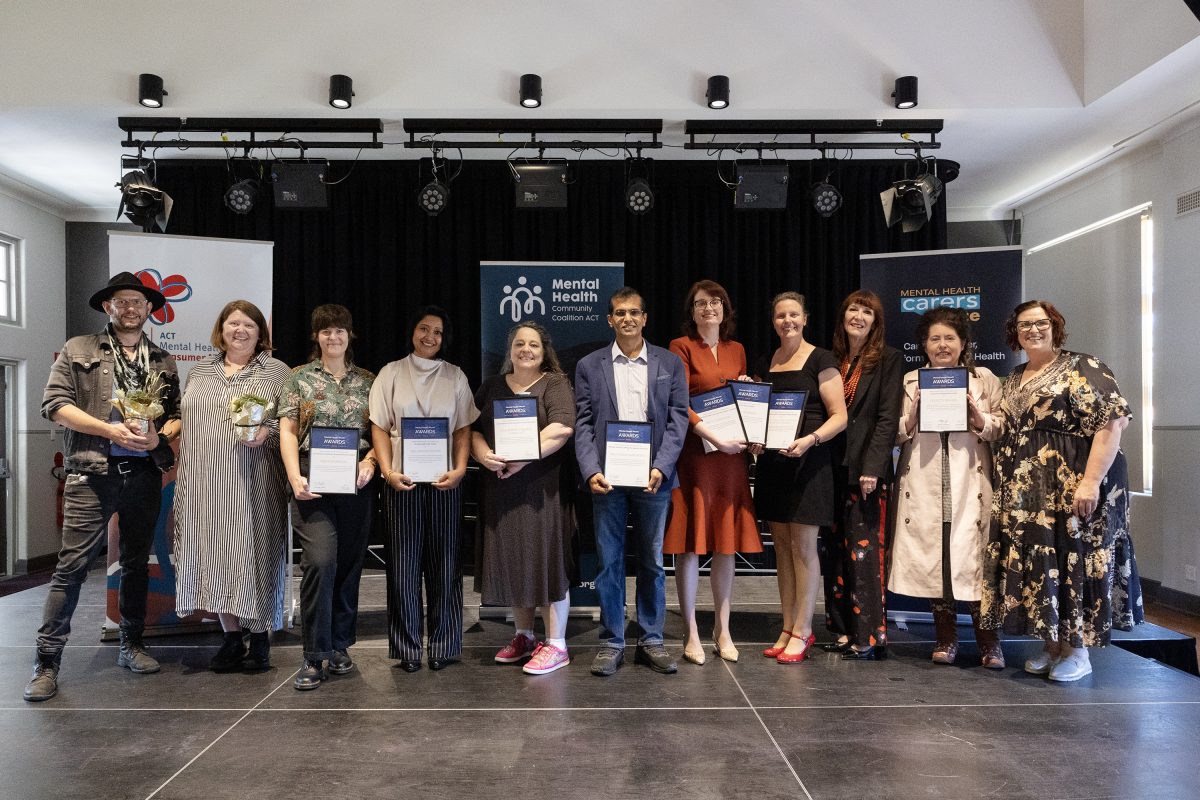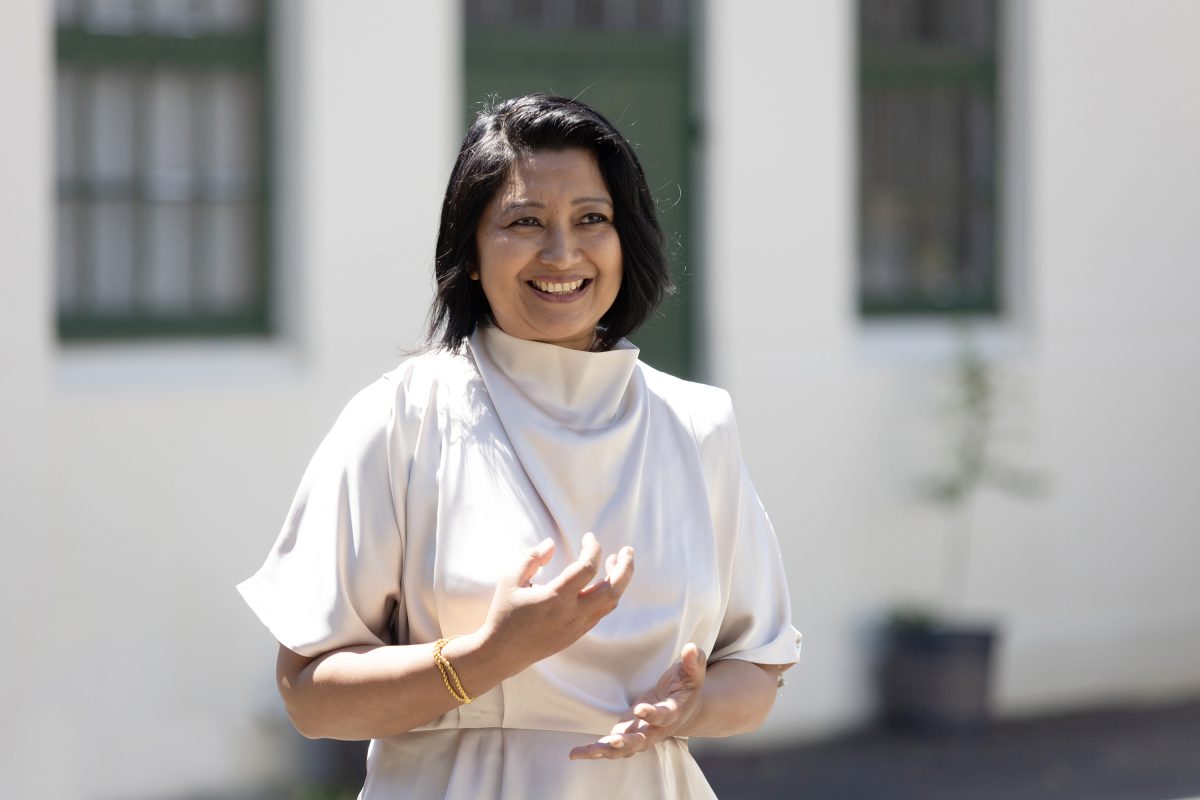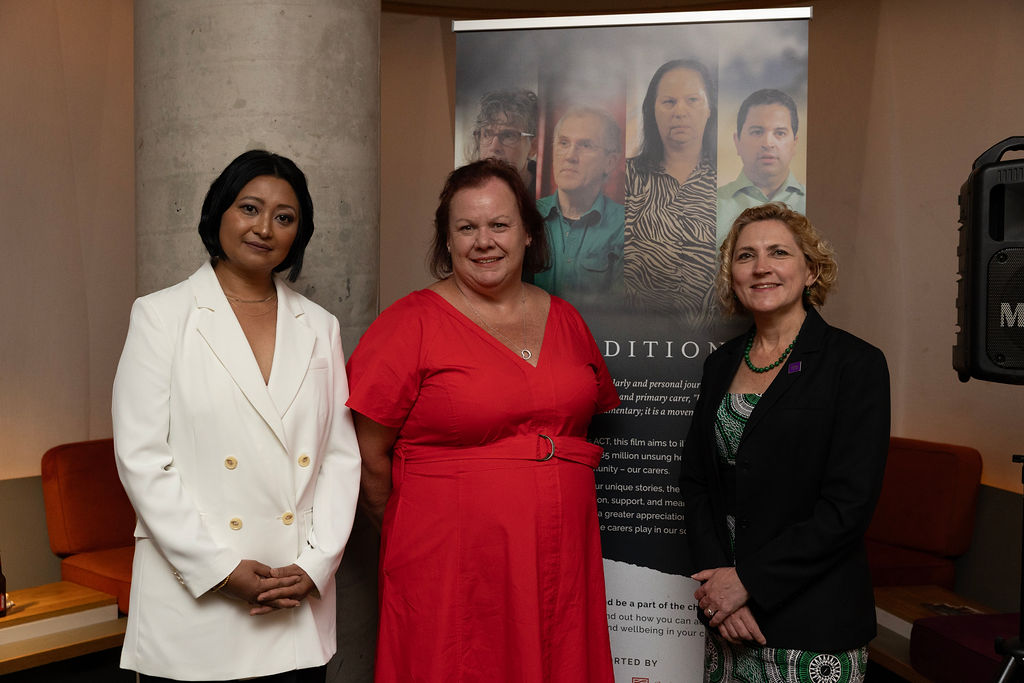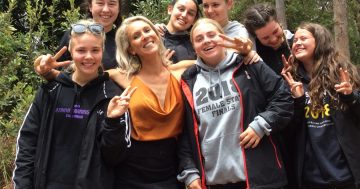
Singer Ben Drysdale and Jen Nixon with winners Nova, Dalanghi, Catherine, Ravi and Prue Slaughter, Dalane Drexler (ACT Mental Health Consumer Network), Yvonne Luxford (Mental Health Community Coalition of the ACT), and Felicity and Melanie Greenhalgh. Photo: Cass Atkinson.
A Canberra PhD candidate, wife, mother and life-long carer has been recognised for her work in mental health after she created a documentary to shed light on the “invisible life” of a carer.
Released in March 2024, Unconditional highlights four carers from across the ACT.
They include Megan, a mother to an adult with cystic fibrosis; Razi, who has looked after his elderly parents for 15 years; Craig, with a partner and children with complex needs; and Deborah, who has an adult autistic son.
The 87-minute feature debuted at the Palace Electric Cinema in March and, as of August, has been showing internationally.
Creator and director Dalanglin Dkhar was awarded the Mental Health Carer Award at the 2024 Mental Health Month Awards on 30 October, which recognises “outstanding contributions of individuals, groups and organisations working to improve mental health and wellbeing in the ACT”.
“It was just really lovely to be acknowledged for being a carer,” she says.
“We’re a pretty invisible lot. A lot of people are really not aware of what carers do – they think carers are the people who are paid to come and look after a person you care for … but a carer could be a family member or a friend. In many cases, it is a lifetime commitment, and carers forego a career, education and income because there is such a sense of responsibility in looking after the person.”
There are more than 3 million carers in Australia, but as Dalanglin points out, they’re only the ones who identify as carers.
“There are so many others who don’t even see themselves as one because they just feel ‘this is what I have to do’.”
A 2019 report by Deloitte, commissioned by Carers Australia, estimated the hours these “informal” carers put in save the taxpayer $77.9 billion a year in what would otherwise require government-funded services.
Dalanglin’s son Sydney turns 14 next month, marking 14 years she’s been one of these full-time informal carers.
“He has non-speaking autism, and we’ve had a few rough years recently with school, after which Sydney was diagnosed with complex PTSD … so we sort of live in a very small bubble because that’s as much as he can manage for now,” she says.

Dalanglin Dkhar produced TV shows in Sydney before moving to Canberra nearly 20 years ago. Photo: Cass Atkinson.
In her documentary, she wanted viewers to hear “straight from the horse’s mouth” what it’s like.
“A lot of it was influenced by my own experience, but also the experience of my community of friends who are all carers and who have to fight for the rights of the people they care for,” she says.
Before her son came along, Dalanghlin lived in Sydney and produced a weekly TV slot, so “being a storyteller has always been part of my life”.
Even when setting up the interviews for the documentary, she tried to make it as unobtrusive as possible.
“I knew how hard it would be to get someone else to take care of the person you care for so you can be free to sit in front of a TV crew, so all I took from each carer was four hours,” she says.
“And there were other aspects too, like making the crew really small so they weren’t intimidated by having a huge group of people in the house, and then also getting consent from not only the participants but also the care recipient. That mattered to me.”
And she remained flexible.
“Carers, we’re very time-poor; we don’t always sleep much, so we’re very tired, and there’s a lot of stuff being juggled in the air all the time.”
She says she’s been really encouraged by the reaction to the film, especially after a number of cinemas in Tasmania and Queensland picked it up, as well as several mental health organisations and federal government departments.
“I’m really astounded, but also, I think I’ve realised this is a medium that we can use to really engage with people – without being preachy, without being bogged by statistics – because the whole premise of the film is to hear directly from carers.”

Dalanglin Dkhar, Carers ACT CEO Lisa Kelly, and former Greens MLA Emma Davidson at the launch of Unconditional. Photo: Carers ACT.
Her message to Canberrans? Have a coffee with a carer sometime.
“A lot of carers live under a big strain of mental health, whether it’s depression, anxiety, trauma, secondary trauma from the trauma their person has gone through,” she says.
“So if you know a friend who’s a carer, drop in with a cup of coffee or just pick up a phone, text them. They don’t have to be big acts. They can be very small everyday acts, but just acknowledge what they do.”
Other individual recipients of the 2024 Mental Health Month Awards include Nova Marmion, Vendra Begonja, Beth Garwood, Ravi Krishnamurthy, Julia Bocking, Catherine Vonarx, Amy Warner and Felicity Maher.
Mental Health Community Coalition of the ACT chair Yvonne Luxford said each one’s “dedication to improving mental health in Canberra and beyond is both inspiring and essential to the wellbeing of so many individuals”.
“We are incredibly proud to recognise their contributions.”
To watch the film, visit Unconditional.















